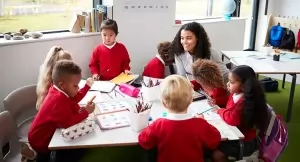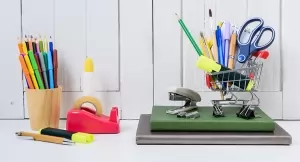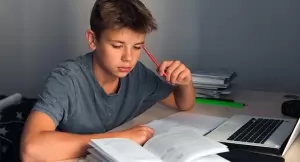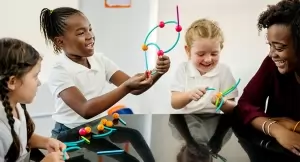10 life hacks all teachers will want to know
Teaching can be one of the very best jobs in the world for those who love to get into the classroom and pass their knowledge on to young minds. But we can all use some help from time to time to make the job that little bit easier, right?
Here, we take a look at ten of the very best life hacks you can bring into the classroom to make your job just a tad easier.
Use emails
Emails are almost outdated in the world of social media, but they can be a great way to stay in touch and engage parents. If you're assigning homework, why not send it in an attachment to your parents' mailing list so they always know what's going on?
QR codes
At a parents' night, some attendees will want to know how they can stay in touch before the next meeting so they are able to keep track of their child's progress. More and more teachers are utilising smart technology and setting up a simple QR code parents can scan to get their contact info.
Technology and learning
It's easy to want to stifle the use of technology, particularly in high schools where smartphone use can be distracting. But why not embrace it? Ask pupils to research online and use their smartphones to actually learn. Chances are they'll be far more engaged this way.
Apps
Getting control of a class of children is never easy, but you can make it far easier for yourself by downloading apps that set off an alarm when pupils get too loud. It's a far better alternative to raising your voice.
Reminders
Are your pupils prone to forgetting things? Paper wristbands with reminders them can be not only useful but fun, and students will get used to having reminders on their wrist, meaning they will be far less forgetful in the future.
Pom poms
Are you always losing your white board eraser at the exact moment you need it? There's nothing worse, but you can rid yourself of this problem by gluing small woolly pom poms to the end of your white board markers. Ready made erasers on top of your markers at all times? Result.
Hand signals
When you're trying to teach, it can be a pain to have to interrupt a lesson for a pupil to ask if they can go to the toilet, borrow a pencil or have a tissue. So why not use hand signals? A system of different signals for different requests can mean you can continue teaching without having to stop and start all the time.
Finished drawer
When pupils finish their work, they can often become bored and start distracting others. A drawer specifically for those who finish quickly, filled with craft materials and brain teasers, can be a good idea for occupying them and stopping them from putting others off their work.
Start the day right
You want to get off on the right foot every day; we all do, and pupils are no different. You can help them start the day with a smile by telling your cheesiest joke each morning, or why not ask each of them to take a turn? It'll make for a fun start to each day.
White boards
Who doesn't love writing on white boards? Pupils love to copy their teacher, and it can be a great idea to allow them to write on their own personal white boards while you do. These can be made very cheaply as well. Use plastic table cloths from pound shops stretched over cardboard for instant personal white boards.
How to make it fun in any classroom
In any classroom, striking a balance between serious learning and fun can be a fantastic way to ensure the kids are kept engaged and interested in what you're teaching them.
Having fun activities and keeping things light from time to time means pupils don't dread coming to class, and means they're far more likely to listen to you, especially when they've got something to look forward to.
We take a look at the top ways you can help make it fun in your classroom.
Start the week right
Monday morning isn't the best time of the week for anyone, let alone kids who have just enjoyed a fantastic weekend with their friends and family, and getting people engaged with work at this time of the week can be hard. Why not let them start their school week with memories of the weekend.
Have some circle time on a Monday morning and allow kids the chance to tell everyone else what a great time they had. Doing so will mean they feel excited about what they did at the weekend, and you'll start your teaching on a happy note, giving more scope for better Monday learning.
Fun time
In many schools across the country, fun time or golden time can be a good way to incentivise kids to get everything done and do well in their school work. Once a week, set aside some time to allow those who have worked hard throughout the week have fun.
It's a good idea to award time to kids throughout the week so they feel like they've earned a little time to do what they want on a Friday afternoon. Let them choose from a range of games, craft activities and other fun things and they'll look forward to it all week.
Sing along
The rise of movies such as Frozen has given kids a new love for the world of singing along to popular songs, and you can bring this into the classroom with a little singing time as a class to let everyone express themselves.
Choose one afternoon a week to get everyone together in one place and have a good sing along. It can even be a good idea to let people take turns choosing the songs you'll all sing so that everyone really feels like a part of it.
Crafts
Everyone loves crafts and being arty, and kids perhaps more so than anyone else. We all loved Art Attack as kids ourselves, so why not bring the spirit of Neil Buchanan back into your adult life by showing kids how they can be creative with things they find at home.
Invite your pupils to bring things from home and then challenge them to turn them into great works of art that can have pride of place as decorations in your classroom. Not only will this be great fun for all involved, it'll be a fantastic way to allow more creativity to flow through your lessons.
Five essential materials every classroom needs
For any teacher going into the classroom for the first time, it's easy to think that all you'll need is your mind and some brilliant new ideas to help pupils learn. But every little helps, doesn't it? And you can make use of some fantastic materials and items to make your life that little bit easier when you take control of a class for the very first time.
Here, we take a look at just a few of the fantastic things every teacher should consider buying before they take their first step into the classroom.
Staple remover
Surely we all remember the pain that was the last day of term when we were at school, when the teacher would enlist the help of pupils to take down the wall decorations that had been hanging for the past year in the classroom. The one problem that always reared its head was that of stubborn staples lodged in the wall, a nightmare to get out. Don't make the same mistake as your teachers did! It sounds simple, sure, but a staple remover is an absolute lifesaver!
Stickers
You don't have the time, as much as we're sure you'd love to, to write a personal message of encouragement on every piece of homework you've marked, and this is where stickers can come in useful. Little smiley faces and farmyard animals with speech bubbles may seem a little bit archaic for the modern classroom, but they're timeless and always go down well with your pupils.
Egg timer
Do you have set times for pupils to complete a task? Then an egg timer is your best friend. Set it up in the middle of a table where pupils are doing a deadlined task and they'll quickly get the hang of working in timed conditions. It's great practice for them, and it allows you to set a time and then head off to do something else while it runs down.
Craft supplies
From time to time, some pupils will be finished their work far earlier than others. What you can do in these situations is to give them something to keep them busy. It keeps them from hassling other pupils and distracting you. Craft supplies are a great way to do this, and it feels like a reward for the pupils, so they'll love it too!
Extra pencils and erasers
Everyone forgets their stationery from time to time, particularly younger students, so it's always a good idea to have some spares to hand. Remember, we were all young and forgetful once, and it's best not to chastise them for what was most likely an honest mistake.
Top ways teachers can modernise homework
Homework; it's one of those things that's been part of the school life of each and every pupil who has gone to school for what feels like hundreds of years. But has it ever really changed? It seems that despite every other change that schools and lessons embrace, homework often remains exactly the same and goes through very few periods of modernisation.
However, for forward-thinking teachers, there are actually many chances to change the way homework is delivered and received. We take a look at just a few of the ways teachers can embrace new ideas and new technology and bring homework into a new age.
Use emails
We've all heard that one about the homework that was worked absolutely meticulously on all evening, only to go miraculously missing on the way to school. It's a tragic tale for all involved, but one that can thankfully be mitigated against with the use of technology. Why not have your pupils email their homework to you? That way, there's no real excuse for them not to have done what you asked, and you can track easily who has sent what over to you.
Apps
Pupils are stuck to their iPads and iPhones these days apparently, so why not use this love of the tablet and smartphone to get them learning? There are a plentiful supply of educational game apps out there that you can have your pupils play. Sure, it's not traditional, but they'll be learning while hardly realising it, and you can have them all show off their scores to compete in class, which adds a little element of something different to the concept of homework.
Lessons
The internet allows you to teach, as well as set homework, in all new ways. Perhaps you have a class that learns better by listening than answering? Then why not make use of the many video sites that are out there these days? Record some lectures in your spare time and send them on to your class to watch instead of doing traditional homework. It'll be a good way for them to learn without even realising they're doing homework, and a good way for you to make use of modern tech to bring your lessons into a new millennium.
We all want to be the very best we can be each and every time we step into the classroom, but from time to time, it can feel like we're on an uphill struggle to do so, and everyone can use some help when it comes to being the best teacher possible.
So here we take a look at just a few of the very best tips around that teachers can use to make sure they are the very best they can be every day in the classroom.
Set out clear goals
It can be easier to plan your day to day classroom work if you have a bigger goal in place. What do you hope to achieve from your job in the next year, two years or five years? Set out some goals and write them down for yourself. No one else even needs to see them. The important thing is that you have something to work towards and you know what you're aiming for, helping you work harder every day.
Realise your true purpose
As teachers, everyone has a purpose in their career, to pass knowledge on to pupils and prepare them for their later life. Once you realise this and truly come to terms with what you are tasked with, you realise how important what you do is. This realisation can give you the sort of pleasure you should have from going into the classroom each morning.
Expect success
If you don't expect your pupils to succeed, they won't either. Kids need someone to show some belief in them, and you are their first point of contact. Show kids that you believe in them every day, and push them towards success, and chances are they'll be able to keep pace in no time at all.
Have a laugh
Don't forget that you're working with kids in this career, and they enjoy laughing more than most of us. If someone has a little joke and a laugh in the classroom, try not to stamp it out. Sure, draw the line if it goes on too long, but being seen as that monster who hates laughter will do you no good when it comes to building a relationship with your class.
Don't praise too often
We all want our classes to do well, so when someone does, it's only natural to praise them. However, as teachers, we need to make sure this is always 100 per cent authentic and deserved. Praising every little thing dilutes the impact of your praise, and while it may do a world of good at first, pupils will start to lose respect for your praise if it appears too readily given out.
Be consistent
Pupils work best in a classroom where consistency is treasured, and that starts with you. No one is saying you need to be the exact same person every day, but it's important you don't let private things affect your mood at work. If the kids don't know what you to expect, they will be a bit uneasy and not learn as well.
Communicate
Communicate with pupils and parents alike. If someone isn't doing as well, don't be afraid to tell them where they're going wrong. It'll only help them learn how to improve in the future. Similarly with parents, never be afraid to tell them their kid is struggling - the likelihood is they'll want to help you improve their work wherever they can.
Be adaptable
Sure, your lesson plans are probably spot on and well researched, but you should always be aware of chances and needs to adapt. If pupils are not engaging or not understanding, never be afraid to change what you're doing. It'll help in the long run.
Explore new ideas
You might have been working the job for years, but things change. New technologies, new ways of teaching and anything else new can help. Don't be afraid to embrace anything that can help your job!
Make it fun
And finally, make it fun! Pupils need that authority in their educational life, but they also need fun from time to time. Set aside some time each week to just let the pupils be themselves and open up. They'll have fun, and they'll learn better for it before and after.
Top five ways to get pupils paying attention
Every class has those few pupils who it is hard to gain the attention of throughout the day. At some points, it'll be just one or two, and then for harder and drier lessons it can sometimes feel like the whole class's attention has gone on holiday and left their empty shells in front of you, refusing to learn.
Here, we take a look at some novel ways to help pupils pay attention better in your classroom, sure to help any teacher in times of real frustration.
Regular recaps
Nothing will make someone pay attention more than the worry that they might be asked what is going on and not know. Let it be known in your class that you'll regularly be looking for someone to recap the lesson so far so everyone can keep up, and the chances are, everyone will be paying attention so they don't end up looking like they weren't paying attention on the off chance their turn comes around.
Talking item
When it comes to answering questions, have an item, a soft toy or the like, that gets passed randomly to the next person to answer. If pupils don't know they're next, but are aware they might well be, then the chances are they'll be listening in. Not only that, but they'll be far more likely to engage and think of answers before it comes to them, helping enhance learning throughout the lesson.
Flashing lights
Sometimes, no matter how hard you try, attention spans will falter and you'll be in front of a class that was once working hard, but is now deep in a 30-person chat about who the best Kardashian is, or the like. The best way to tackle this is with a quick sensory gesture. Flashing the lights on and off will grab everyone's attention, and they're sure to know you're not best pleased quick as a flash.
Allow texting
Sounds like such a weird notion, but allowing pupils to text their answers to each other, which the recipient then has to read out, is a really great way to engage everyone. Pupils are basically glued to their phones these days anyway, so why not use this to your advantage? Besides, most people are probably faster with a phone than a pen these days anyway, so you're likely to get through a lot more!
Walking talking
If it feels like you're losing the class' attention, say late on a Friday afternoon, why not take the chance to be a little bit different and help them engage in a different way? Leave the classroom and take the kids for a stroll around the playing fields for a while, all the time keeping the same conversation from the classroom alive to keep people engaged.











